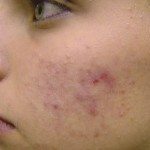What is it?
The pores of our skin contain oil glands that supply moisture to our skin and hair. Sometimes pores become clogged by excess oil, skin cells or bacteria. This results in a skin condition known as acne. Acne shows up as various types of bumps on the skin. The pores might take the form of a whitehead which is closed pore that is bulging outward, a blackhead which is an open pore with a dark surface, or a pimple which is an inflammation due to dead skin and bacteria forming in the opening. It has been indicated that 70 to 80 percent of individuals experience acne at some time in their lives. Modern medicine has now given us the means to control it.
There are four types of acne and each type can be mild, moderate or severe. We will classify your acne by type and severity before a treatment plan is initiated as our treatments differ for each type of acne.
- Blackheads/Whiteheads (Comedone Acne) – This type of acne generally seen in adolescence. They are often seen on the forehead, although the nose, cheeks, chin, back, chest and shoulders may also be affected.
- Papular Acne – These are the inflamed red pimples that do not contain pus. They usually precede pustular acne.
- Pustular Acne – This form of acne is known for its presence of pustules or comedones and pimples. They look very similar to the popular acne only with a white head.
- Nodulocystic Acne – This is the most severe case of acne. The nodular cyst of acne is not a true cyst; they are nodules of inflammation below the skin’s surface. They can appear on the face, neck, chest, back or shoulders.
What are the causes?
Several different conditions can cause acne. Hormonal imbalances, obstructed glands and pores as well as bacteria are the three most common causes. Another contributing factor is family history. If parents were prone to acne, their children are more likely to experience similar hormonal changes and thus are more likely to develop acne, especially in their teen years. Certain medications, moisturizers and cosmetics may lead to acne as well.
How can it be prevented?
- Hygiene – Although acne cannot be completely prevented, good hygiene can help control breakouts. We recommend that you wash your face at least twice a day and soon after any exercise to remove excess oil formation. If you have oily hair, shampoo regularly since hair oils can also cause acne. In addition, avoid touching your face with your hands and keep your hair away from your face when sleeping.
- Diet – Though diet rarely is a cause for acne, there are certain foods that can worsen your acne. Such foods include those that have high calcium content, such as milk, or high iodine content such as seafood.
- Sunscreen – Avoiding prolonged sun exposure is key in controlling acne and other skin conditions. Be sure to wear a protective sunscreen at all times when exposed to the sun.
- Relieving Stress – It is important to exercise regularly and manage your stress level to help maintain hormonal balance. Rest is also an important factor in reducing your stress level.
What are the treatments?
Acne can be effectively treated using advanced light technology, oral prescriptions and topical medications, as well as medical-grade chemical peels and slushes.
- Light Technology
Using lasers and light technology in combination with Photo Dynamic Therapy (PDT) can effectively target acne-causing bacteria without thermally affecting the surrounding tissues. Our FDA approved treatments are painless, easy and safe and can clear most moderate inflammatory acne in as little as eight sessions. Light treatment offers many benefits over other alternatives including a short treatment regimen that is non-invasive and has no side effects.
- Oral Isotretinoids
Oral Isotretinoids are powerful oral prescription drugs for the treatment of severe acne. These drugs can take between four to five months before acne is completely cleared. These drugs are derivatives of Vitamin A, a natural substance found in our bloodstream that is easily absorbed. They have many possible side effects, some of them serious, such as depression and the concern with long-term toxicity to bones and internal organs, which should be monitored by your physician. It is not an option for pregnant women as it may cause birth defects and it is essential for women of child bearing age to be on birth control. - Topical Medications
A variety of topical medications may be prescribed to directly control and kill the Propionibacterium acnes (P-acnes) bacteria which most often cause acne. These medications help reduce the infection in the pores and keep them from becoming clogged with bacteria. Oral antibiotics such as; Clindamycin, Minocycline and Tetracycline are available by prescription only. Some are in topical forms including cream, lotion or gel. Please contact our clinic for more information on these medications. - Amino Acid Peel
This medical-grade chemical peel dramatically improves moisture retention and purifies the skin. The simple and effective Amino Acid peel is a two-step process that begins with a micro-exfoliating masque of acidified amino acid combined with a soothing clay, followed by a gentle exfoliating gel that removes cellular debris. This combination produces noticeable improvements in the appearance, texture and elasticity of the skin. Acidified amino acid, the principal ingredient, combines the visible anti-aging benefits of improved exfoliation and moisture retention with remarkably low levels of irritation. This peel is ideal for sun damage, acne and Melasma conditions. For optimum results, a series of six treatments every two weeks is recommended.
